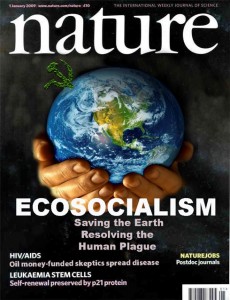Dankzij werk voor een nieuw artikel over visserij-alarmisme kwam ik terecht bij de paper van Ray Hilborn, visserijprof aan de Universiteit van Washington. Hij wijst op de problemen met peer review bij Nature en Science ten aanzien van alarmistische ‘de zee is leeg’papers, waarover afgelopen najaar eindelijk controverse ontstond.
Falende Peer Review: Vis en klimaat lijken op elkaar
Zijn kritiek kun je lineair doortrekken naar die over klimaat die Marcel in De Staat van het Klimat ook al aanstipte: ‘gatekeeping’ van sceptische papers enerzijds, en het doorlaten van gemankeerd werk van Michael Mann anderszijds.Er komen allerlei papers in, die veel media-aandacht krijgen en die ‘de goede zaak’dienen, maar die wetenschappelijk ondermaats zijn. Wie herinnert zich nog Steig et al, op de voorkant van Neetjur? (de Zuidpool warmde niet op maar na wat gegoochel plotseling gelukkig toch)
‘This faith-based fisheries movement has emerged in the last decade, and it threatens the very heart of the scientific process—peer review and publication in the top journals. Two journals with the highest profile, Science and Nature, clearly publish articles on fisheries not for their scientific merit, but for their publicity value.’
Hilborn reageert ..
..op de kritiekloze ophemeling van het concept van ‘fishing down the foodchain’van Pauly , dat in het systeem zit van iedere fondswervende NGO, en zelfs de basis vormt van de Convention on Biodiversity. De directeur van ECNC Rob Wolters kwam er ook bij mij mee aanzetten ‘straks zitten er alleen nog kwallen in zee’. Hij baseert zich op het in media luid verkondigde idee dat visserij eerst alle grote vissen vangt, en dan steeds lagere trofische niveaus wegneemt.
Maar, zoals Hilborn al constateert op basis van data in plaats van politieke blindheid.
• Fish high on the food web are no more valuable than those low on
the food web.
• Fisheries do not begin high on the food web.
• The food web index is not a useful measure of the status of
an ecosystem.
• The food web index itself is increasing worldwide, not declining.
• When we look at trends in abundance, large fish are not
declining.
Eéns in de media, altijd in de media
Zoals ik ook al mocht constateren, in mijn blog over de ‘vijfentwintig procent van alle diersoorten sterft uit door klimaat’claim: de schade is al gedaan, zelfs Skarsterlan nijs, het gemeenteblad in nuchter Friesland komt er 7 jaar later nog mee op de proppen. Ookal is het onzin, de claim blijft rondzingen, als rechtvaardiging voor allerlei activisme.
The original paper has not been withdrawn and continues to frequently cited as an example of near extinction of marine species.
En
These examples illustrate a failure of the peer review system and lack of the
basic skepticism needed in science, and are unfortunately but a few of the many papers
now appearing with similar sensational but unsubstantiated headlines.A community of belief has arisen whose credo has become “fisheries management has failed, we need to abandon the oldapproaches and use marine protected areas and ecosystem-based management. I fear that this belief has shaded the peer review process so badly that almost any paper showing a significant decline in fish abundance
or benefits of marine protected areas has a high probability of getting favorable
reviews in some journals regardless of the quality of the analysis.
Auh!
Critical peer review has been replaced by faith-based support for
ideas and too many scientists have become advocates. An advocate knows the answer
and looks for evidence to support it; a scientist asks nature how much support there
is for competing hypotheses
We mogen constateren dat Neetjur en Saaiens teveel op een voetstuk staan.
Because of their general coverage, Science and Nature must have problems identifying
appropriate reviewers for an individual paper. While there is no easy solution to
this, a good step would be for journals to publish the names of reviewers who
recommend publication. That would at least make it clear if these journals are
relying on a small group of like-minded reviewers who have little expertise relevant
to technical papers.Finally, the fact that discredited papers continue to be widely
cited is aggravated by the fact the rebuttals frequently are not published by the original
journal and may appear in gray literature or technical journals.







De verborgen kosten van windenergie:
http://www.dailymail.co.uk/home/moslive/article-1…
Beste Erik: we hebben een offtopic linkdump daarvoor en bovenstaande hebben we al behandeld
Rypke, nu ga je wel een hele grote beerput opentrekken hoor.
Ook in het visserij-wanbeleid barst het van de clubs die zichzelf dmv een groen stickertje van een royale boterham voorzien.
Verdiep je bv maar eens zeer oppervlakkig in het MSC-label en kijk dan vooral wélke bedrijven als eerste dat label verkregen. Da's huilen met de pet op zoals mijn opoe zou zeggen. De grootste moordenaars kregen de eerste labels, en de verantwoorde visserij tot 300pk moet de koppen bij elkaar steken om dat label te kunnen bemachtigen (want hebben individueel geen geld genoeg).
Blijven we gewoon dicht bij je nieuwe huis dan hoef je alleen maar te kijken naar banengeneratoren zoals de Waddenvereniging. Ook daar brult men alom alarmisme van het miljoenen kostende kantoorgebouw en probeert men de visserij op het Wad de nek om te draaien met allerlei kulredenen.
De kokkelvisserij was daar het eerste slachtoffer van, de rest staat nu onder zware druk.
Er is een boek over te schrijven…
Rypke, bedankt voor dit interessante stuk. Ik had laatst een documentaire gezien met de naam The End of the Line en daar was ik niet bepaald vrolijk van geworden. Ray Hilborn zat daar overigens ook in. Ik moet de docu nog eens terugkijken om te zien wat hij precies zegt, maar volgens mij is het precies hetzelfde als wat hij elders zegt: overbevissing is niet zo erg als het voorgesteld wordt, maar de effecten moeten ook zeker niet onderschat worden. Nu ik je links heb gevolgd en gelezen heb, ben ik op dat punt wat meer gerustgesteld. Dank dus daarvoor. Ray Hilborn is ook te zien in dit driedelige Youtube-filmpje, wat ik zeer kan aanraden als je wilt weten wat Hilborn precies denkt.
Het gevaar van je artikel, Rypke, is namelijk dat mensen denken dat je Hilborn gelijkstelt aan klimaatsceptici, en dat hij dus zegt dat overbevissing een klein of zelfs geen enkel probleem is. Dit is geenszins het geval.
En zo loopt je analogie op meer punten spaak. Uiteraard is het systeem van peer-review niet perfect (dat beweert vrijwel niemand) en glippen er in verschillende vakgebieden zo nu en dan papers met een alarmistische toon door omdat het 'sexy' is of omdat er een bepaalde culturele druk (door een al dan niet terecht groeiend bewustzijn omtrent een potentieel probleem) achter zit. Maar Hilborn stelt nergens dat er sprake is van "gatekeeping van sceptische papers". In zijn vakgebied is er een groep die zegt dat het heel erg de slechte kant op gaat, en er is een groep die zegt dat er heel veel ruimte voor verbetering is. Dat lijkt me niet meer dan een normale situatie in de wetenschap, en de tijd zal uitwijzen welke groep meer gelijk heeft. Misschien hebben ze wel allebei gelijk en gaat het heel erg de verkeerde kant op, maar kan er veel verbeterd worden.
Het is in ieder geval niet zo dat de gematigde groep, die neem ik aan vrij groot is, buitengesloten wordt. De klimaatskeptische groep beweegt zich in de marge, produceert regelmatig wetenschappelijk dubieus werk en is zelf niet vies van alarmisme. Dat is een riant verschil.
Nogmaals, peer-review is niet perfect, maar het is waarschijnlijk wel het beste wat we hebben. Science en Nature zijn ook niet perfect, maar zijn misschien ook wel het beste wat we hebben.
Hier moet je misschien nog wat verder in duiken. De Zuidpool warmt namelijk wel op, al is het op minder spectaculaire wijze dan op de Noordpool. Zoals je waarschijnlijk wel weet, is er onlangs een paper door skeptici als Ryan O'Donnell (RyanO) en Patrick Condon (Jeff Id) gepubliceerd die de methodes van Steig et al. bekritiseren. Dit is door de denio-sphere met veel bombarie onthaald als een weerlegging van de conclusies van Steig et al. Ze doen dit zoals altijd zo luidkeels dat mensen die het oppervlakkig onderzoeken de indruk krijgen dat de Zuidpool helemaal niet is opgewarmd de afgelopen decennia. Maar dat is niet het geval, O'Donnell et al. bevestigen dat er sprake van een opwarming in delen van Antarctica is geweest, maar komen op een andere manier dan Steig et al. tot die conclusie. Toevallig heeft Eric Steig hier eergisteren een stuk over geplaatst op RealClimate. Ik kan het aanraden voor wie er meer over wil weten.
Wel is het zo dat O'Donnell et al. heel veel moeite hebben moeten doen om de paper überhaupt gepubliceerd te krijgen, wat niet gek is na alle polarisatie en het wantrouwen dat is ontstaan door de fratsen die vroegere skeptici als Soon en Balunias en McKitrick hebben uitgehaald om hun gebrekkige werk in de peer-reviewed literature te forceren.
Dat een aantal skeptici eindelijk serieus de handschoen hebben opgepikt (ook met het zelf produceren van temperatuurreconstructies) en dat deze, zij het met ietwat gemor, langzaam geaccepteerd worden door de gevestigde orde, lijkt mij een zeer goede ontwikkeling. Ik ben in ieder geval blij dat ik hierdoor minder reden heb om te twijfelen aan de integriteit van mensen als RyanO, Jeff Id en RomanM.
@Neven
Qua Steig et al denk ik dat je je vergist. McIntyre heeft er recent nog met enkelen in het Journal of Climate een correctie op gepubliceerd met enkele andere auteurs
Sommige delen warmen op, maar andere delen koelen weer af. Het leidt tot een totaal ander plaatje dan de roodgloeiende zuidpool waar Steig mee kwam (en Mann als co-auteur)
Wanneer je met clichés komt als 'peer review is het beste wat we hebben', dan heb je de boodschap van Hilborn niet begrepen
Wat stelt hij: itt tot de echte vakbladen is men geneigd sneller sensationele mediagenieke studies te publiceren, heeft men een beperkt clubje reviewers die slechte papers met de juiste politieke lading laten doorsijpelen
Ik hoor meerdere wetenschappers daarover klagen: Nature wil vooral studies publiceren die in de kop van één sensationeel persbericht passen
Bij Global Warming is dat ook herhaaldelijk gebeurd. Zoals met een studie aan druiven in de Middeleeuwen die zou aantonen dat de MWP niet bestond: als het in een politiek straatje past komt 't er eerder in. Vandaar dat ik met even creatief uitleefde in Photoshop met een cover van Nature
Want wat schrijft Hilborn ook, dat deze bladen zich zo bewust zijn van hun politieke invloed
Het is ook altijd weer opvallend hoe van die 'de aarde gaat ten onder'studies altijd prachtig getimed vlak voor of tijdens klimaatconferenties verschijnen: je zult beweren dat de indienenrs daar geen invloed op hebben, maar de redactie wel
Je opmerking 'klimaatsceptici beweren dat nergens overbevissing bestaat' kan ik werkelijk helemaal niks mee. Vind je dat erg?
Maar verder leuk dat je er weer bent
@Leo: dat boek zijn we mee bezig, je haalt een paar aardige punten aan die we onderzoeken,
@neven, die Donnell paper schreef McIntyre aan mee: je probeert die kerel weer eens doelbewust zwart te maken, terwijl het gewoon een credible integere onderzoeker is: maar hij deelt je ongefundeerde alarmisme niet dus doe je alsof zijn werk zo slecht is dat hij het nergens in krijgt: wanneer leer je het nu eens?
Rypke, nergens in mijn comment heb ik het over McIntyre gehad. Heb je dat stuk van Steig van eergisteren al gelezen?
Heel goed, en wat schreef je in het artikel hierboven?
Wanneer leer je het nu eens? :-P
Da's heel goed nieuws Rypke. :~)
Vergeet dan ook de "beschermende" Scholbox niet waar nu geen scholletje meer te vinden is.
En ga op bezoek bij de heer Boddeke, die je alles kan vertellen over hoe een milieumaatregel er voor zorgt dat de zee nu minder opbrengt.
En en en.. Zo kan ik nog wel ff doorgaan.
Je staat op de rand van een beerput alwaar -zoals goed groen gedrag betaamt- nooit is geluisterd naar praktijkmensen, maar wél naar vegetarische rapportjesschrijvers en geldgraaiende organisaties.
Veel succes met het boek.
Wanneer komt het uit?